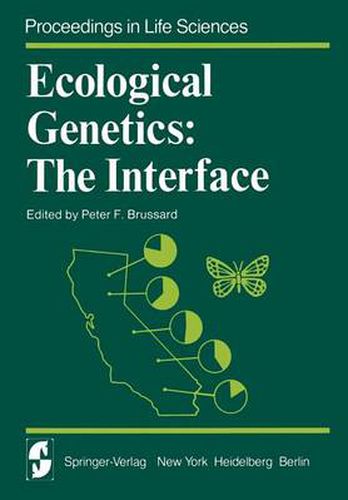Readings Newsletter
Become a Readings Member to make your shopping experience even easier.
Sign in or sign up for free!
You’re not far away from qualifying for FREE standard shipping within Australia
You’ve qualified for FREE standard shipping within Australia
The cart is loading…






This title is printed to order. This book may have been self-published. If so, we cannot guarantee the quality of the content. In the main most books will have gone through the editing process however some may not. We therefore suggest that you be aware of this before ordering this book. If in doubt check either the author or publisher’s details as we are unable to accept any returns unless they are faulty. Please contact us if you have any questions.
Traditionally, studies in ecological genetics have involved both field observations and laboratory genetic analyses. Comparisons and cor relations between these two kinds of data have provided valuable in formation on the genetic strategies behind the evolutionary adapta tions of species and their component local populations. Indeed, much of our current understanding of the dynamics of evolutionary pro cesses has come fro~ syntheses of ecological and genetic information. Since the recent discovery of abundant markers in the form of protein polymorphisms, scientific interest in the connections between genetics and ecology has quickened considerably. This volume contains the proceedings of the Society for the Study of Evolution’s symposium, Genetics and Ecology: The Interface, held at Ithaca College, Ithaca, New York, June 12-15, 1977. This particular topic was selected because of a general feeling that a significant integration of genetics and ecology has developed in the last decade or so. Host ecologists no longer believe that each species has a characteristic and constant birth, death, and develonment rate, habitat preference, and so on, but that these para~eters vary a~ong populations and are at least partially under genetic control and sub ject to natural selection. Similarly, few population geneticists still view any species as infinitely large, panmictic, constant in numbers, and distributed evenly throughout its range.
$9.00 standard shipping within Australia
FREE standard shipping within Australia for orders over $100.00
Express & International shipping calculated at checkout
This title is printed to order. This book may have been self-published. If so, we cannot guarantee the quality of the content. In the main most books will have gone through the editing process however some may not. We therefore suggest that you be aware of this before ordering this book. If in doubt check either the author or publisher’s details as we are unable to accept any returns unless they are faulty. Please contact us if you have any questions.
Traditionally, studies in ecological genetics have involved both field observations and laboratory genetic analyses. Comparisons and cor relations between these two kinds of data have provided valuable in formation on the genetic strategies behind the evolutionary adapta tions of species and their component local populations. Indeed, much of our current understanding of the dynamics of evolutionary pro cesses has come fro~ syntheses of ecological and genetic information. Since the recent discovery of abundant markers in the form of protein polymorphisms, scientific interest in the connections between genetics and ecology has quickened considerably. This volume contains the proceedings of the Society for the Study of Evolution’s symposium, Genetics and Ecology: The Interface, held at Ithaca College, Ithaca, New York, June 12-15, 1977. This particular topic was selected because of a general feeling that a significant integration of genetics and ecology has developed in the last decade or so. Host ecologists no longer believe that each species has a characteristic and constant birth, death, and develonment rate, habitat preference, and so on, but that these para~eters vary a~ong populations and are at least partially under genetic control and sub ject to natural selection. Similarly, few population geneticists still view any species as infinitely large, panmictic, constant in numbers, and distributed evenly throughout its range.